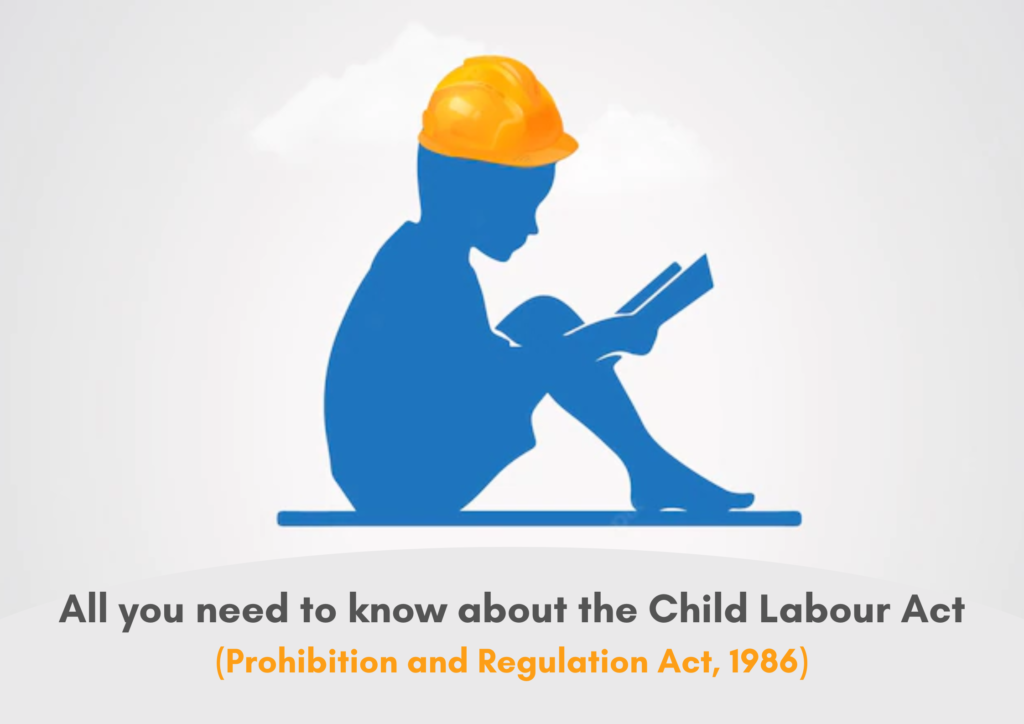Child labor is a global issue that prevents children from fulfilling their potential. Child labor is work done by children that puts their health, safety, development, and education at risk. According to the UN Convention on the Rights of the Child (CRC), “children have the right to be nurtured from hazardous coverings.”Child labour violates children’s rights, and this work can harm them mentally or physically, expose them to hazardous conditions, or chuck them away from schooling. According to the latest ILO statistics, most child labor occurs within the family unit.
Talent pro makes follow-ups with the child-laboring laws to make them ensure compliance with their establishments.
Child Labor (Prohibition and Regulation) Act (CPR), 1986
Child Labor (Prohibition and Regulation) Act, 1986 is of the social duty and to mitigate the participation of children who are below 14 years of age in their working period of their concerned daily tasks and to synchronize the chores of the children that has been deteriorating the child’ education at the verge of risk. In India, some fixed sets of laws governs the apprehensive conditions of child labor. The Child Labor (Prohibition and Regulation) Act 1986 was formed to make the younger generation of the country fenced with the basic requirements during their growing years.
Under the article going through the Child labour,
Article 24 – Fundamental Rights mentioned in the Constitution of India (the law of the land) makes under Right against exploitation also points to the prohibition of employment of children in factories, etc.
List of duties to be registered while admitting a child worker:
The primary work of the employer is to notify the Factory Inspectors in case of making a child for employment. Issuing a certificate of age is also required under the rules of this Act.
Need to be filled & filed:
- The identity of every child who is employed or permitted to work
- Duration of the work and the rest intervals to which they are entitled.
- The Work nature of the concerned child.
Amenities of Child Labour Prohibition and Regulation Act for their Conservation & Protection:
Various provisions relating to safeguarding and protecting the working conditions for the beneficiaries of child, this describes that the child should not be permitted to work neither between 7 p.m. and 8 a.m. nor over time. Also the child is not allowed to work for more than 3 hours without an interval of 1 hour only with the limit of 6 hours in one establishment day.
Ensuring the laws that are under the child labor litigation (Factories Act, 1948):
Section22: No young person is allowed to clean, lubricate or adjust any machine part.
Section23: No young person is allowed to be employable on any dangerous machines.
Section27: prohibits the employment of children in pressing cotton.
The Bidi and Cigar Workers (Conditions of Employment) Act, 1966:
Section24 defines the employment of a child in the industry as strictly prohibited.
Plantation Labor Act, 1951:
Section25: Except with the permission of the State Government, Women and children can be employed only between 6a.m and 7 p.m.
Domestic Workers (Registration Social Security and Welfare) Act, 2008:
Section 14 is against the child’s employment as a household or ancillary worker.
Here are the provisions that are in violation relating to child laboring laws:
The provisions relating to the forfeit for any employer for not adhering to the requirements of the Child Labor (Prohibition & Regulation) Act, 1986 are:
Breach with the employment laws: For employing any child in contravention of the Act’s provisions – imprisonment for not less than three months extending to 1 year or with fine, not less than Rs.10000 rising to Rs.20000, or both.
(Read more: Compliance Failure – A Big Mistake)
With the abode of nature: For the second offense of like nature – imprisonment for not less than six months may extend to 2 years.
Make a register: Fail to maintain a record – simple imprisonment which may extend to 1 month.
(Read more: Need and Importance of Statutory Compliance)
Wrap Up:
Administer the child prohibition act in the hands of Talentpro, make it bolstered to cater to the seekers of compliance services (Shop and Establishment compliances) and make it clear with the ease-services within us.







